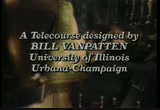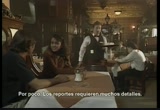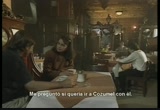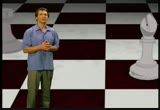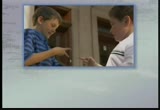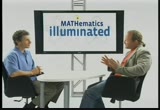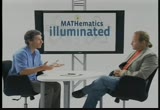tv Democracy Now Special LINKTV October 31, 2012 4:00pm-5:00pm PDT
4:00 pm
4:01 pm
aló, aló. iluis! ¿cómo estás? señora, como le expliqué ya no hay nada que se pueda hacer por su padre. pueden llevarlo a su casa como él quiere. pronto estará en casa como quería, y yo no tendré que aguantar más sus quejas. yo sé que regreso a mi casa para morir. en este momento el doctor se lo está diciendo a mi hija. señor castillo... itú sabes muy bien a lo que me refiero! no tenías ningún derecho de hacer venir aquí a luis sin preguntarme, sin avisarme siquiera. iningún derecho! pati, tal vez mañana lleven a papá de regreso a la gavia. y tú quieres regresar también, ¿verdad? creo que debo regresar. vengo de la gavia y decidí pasar a verlos
4:02 pm
de camino a casa. ¿saben algo de don fernando? pues sí, pero... las noticias no son muy buenas. captioning of this program is made possible by the annenberg/cpb project and the geraldine r. dodge foundation. en el episodio previo, luis sorprendió a raquel con su plan de pasar el fin de semana en zihuatanejo. ¿qué es esto? pero la reacción de raquel sorprendió a luis. ¿para dos? ¿quieres decir, para nosotros dos? no te enojes. se trata de una sorpresa. creí que te alegrarías.
4:03 pm
mientras tanto carlos y su familia esperaban el regreso de gloria. ¿papa? sí, hijita. ¿cuándo regresará mami? pronto, juanita, no tarda, ¿eh? en nueva york, juan se levantó y no encontró a pati. pati... entonces decidió ir al teatro. bueno, es todo por hoy. todos: hasta mañana. pati... me parece que no has cambiado de opinión. ya te expliqué mi posición. eres tú quien no has cambiado de opinión. te espero hoy en mi oficina en la tarde. ahora veo el problema que tienes.
4:04 pm
no sabes ni la mitad. bueno, al menos puedo ver que la obra va a ser muy buena. otro triunfo en tu carrera. pati, tal vez mañana lleven a papá de regreso a la gavia. y tú quieres regresar también, ¿verdad? creo que debo regresar. mira, yo había pensado pedirte que vinieras conmigopero... ¿pero...? pues, lo he meditado y... ahora comprendo que no puedo pedirte que vengas. la obra te necesita más que yo. no sabes cuanto me alegra oírte decir eso. yo quisiera irme contigo... yo lo sé, mi amor, lo sé. pero ya incluso hice la reservación para el vuelo. ¿cuándo te vas? hoy mismo. quiero estar allá cuando regrese papá. me llamarás para decirme cómo sigue, ¿verdad? te lo prometo.
4:05 pm
ha sido un gusto. que tenga un buen viaje. el gusto es mío, doctor. gracias. doctor... señora, como le expliqué ya no hay nada que se pueda hacer por su padre. pueden llevarlo a su casa como él quiere. rodearlo de afecto sobre todo eso, darle mucho afecto. deben tener mucho cuidado con él sobre todo, no darle ningún problema y tener mucho cuidado con la limitación. su estado es muy delicado. bueno, señor castillo. pronto estará en su casa como quería
4:06 pm
y yo no tendré que aguantar más sus quejas. yo sé que regreso a mi casa para morir. en este momento el doctor se lo está diciendo a mi hija. señor castillo... oyeme... una vez yo perdí algo muy importante para mí. tú eres joven. tienes toda una larga vida y un futuro por delante. no dejes perder las cosas importantes de la vida.. se me ocurre que no sé cómo te llamas. rosario. mi nombre es rosario. ¿rosario? rosario...
4:07 pm
hola. hola, arturo. ¿cómo estás? bien. sentate. ¿qué querés tomar? un café. a sus órdenes. dos cafés, por favor. en seguida. ¿tuviste algún problema? no, nada. no. todo bien. creí que estabas escribiendo una novela. por poco. los reportes requieren muchos detalles. además tuve que llamar a la oficina. gracias. gracias. a sus órdenes. ¿azúcar? no, gracias. raquel... quería hacerte una pregunta. sí, dime. ¿te gustaría hacer un viaje a cozumel? ¿a cozumel? sí. pienso que podríamos ir juntos a cozumel. pero, no habrás sacado ya los pasajes, ¿verdad?
4:08 pm
eh... no, no, no. no haría una cosa así sin antes consultar contigo. además, pensé que podrían venir tus padres con nosotros. ¿quieres que mis padres vayan también? bueno, ellos han venido de los angeles para verte seré injusto que los dejáramos plantados ¿no te parece? arturo, eres muy comprensivo. ¿qué te parece si esperamos a que ellos lleguen y les preguntamos qué desean hacer? bueno, muy bien. pero mientras tanto nosotros podemos ir viendo posibilidades. aquí tengo mucha información: playas, horarios de vuelos, hoteles, ¿eh?... ¿me puedo sentar? ay, por supuesto. ¿qué tal? que vengo de la gavia y decidí pasar a verlos de camino a casa. ¿y angela y roberto? están descansando. ahora no más deben bajar. ¿saben algo de don fernando?
4:09 pm
pues sí, pero... las noticias no son muy buenas. arturo: ¿ya se saben los resultados de las pruebas? el especialista no nos ha dado esperanzas. ¿quiere decir que va a seguir internado en el hospital? no. el especialista dice que ya no hay nada que hacer. mañana lo llevaremos a la gavia. en estas circunstancias yo creo que angela, roberto y ud., arturo deberían ir a la gavia mañana mismo. arturo: de acuerdo. ¿tú también vendrás? sí, por supuesto. bien. debo irme a hablar con los demás. mis padres deben llegar en cualquier momento. ¿vas a ir a buscarlos al aeropuerto? no. ellos vendrán aquí. yo tengo que sacar unas fotocopias para terminar mi reporte. ¿te acompaño? no es necesario. quédate con angela y roberto. yo volveré luego. bueno, pero ¿nos vemos más tarde?
4:10 pm
sí, por supuesto. hasta luego. hasta luego. hasta luego. hasta luego. te acompaño a la puerta. ipor fin! ¿dónde estabas esta vez? llamé por teléfono a todos lados. estaba muy preocupado. podrías haberme llamado. carlos, perdóname. por favor, no te enojes. vamos, tenemos que hablar claro. yo creo que lo mejor es que el abuelo regrese a casa.
4:11 pm
tal vez así se mejore. ojalá. a veces pasa. hay que ser optimistas. seguro que en su casa se encontrará mejor. tío, ¿te puedo hacer una pregunta? por supuesto. eso no quiere decir que te la voy a contestar. mañana, cuando nos presenten al abuelo se terminará el trabajo de raquel. probablemente volverá a los angeles. ¿has pensado qué vas a hacer? sí... pero es un secreto. iay! vamos, tío, queremos saber. bueno, después lo sabrán. ambos: iah, tío! bien, es hora de que nos vayamos a desempacar. sí, vámonos. nos vemos más tarde. los veré después. ( golpe en la puerta ) un momento. angela: ihola! pasen. raquel, ¿cómo estás? permiso. buenas. ellos son angela y roberto castillo soto
4:12 pm
los nietos de don fernando. mis padres. ay, señora, encantada. mucho gusto. mucho gusto. ¿qué tal? y él es el doctor arturo iglesias. mucho gusto. hola, ¿qué tal? encantado. ¿qué tal? luis: aló, aló. iluis! ¿cómo estás? tenía ud. razón, maría. la idea de venir a méxico fue una muy buena sugerencia de ud. pues, sí... ¿qué les parece si nos vamos a cenar? tú vienes con nosotros, ¿verdad? y ud. también, por supuesto. gracias. raquel, me parece que molesto. pero, arturo... vamos. será divertido. vamos, tío, sí vamos. ¿qué les parece si nos encontramos en una hora en el vestíbulo? así tenemos tiempo para cambiarnos. sí, ya que insistís. vamos, sí.
4:13 pm
( burlándose ): "tenía ud. razón, maría. "la idea de venir a méxico fue una buena sugerencia de su parte." imamás! trajimos mucha ropa para tan pocos días. ( golpe en la puerta ) ay, ime muero de hambre, eh! mamá. ¿te fijaste qué guapo está luis? mamá... , más madu todo un hombre. y le va muy bien, ¿eh? tiene muy buena posición. fíjate que no se ha casado. creo que... imamá! ¿por qué lo hiciste y con qué derecho? ¿hacer qué?
4:14 pm
itú sabes muy bien a lo que me refiero! no tenías ningún derecho de hacer venir aquí a luis sin preguntarme, sin avisarme siquiera. iningún derecho! iluis te quería ver! ay, mamá. por favor, te conozco muy bien. tú le dijiste que viniera. bueno, ¿y qué? ¿cómo que y qué? no sabes el problema que me has causado. mira, el único problema es que tú andas con el gaucho ese de aquí para allá. se llama arturo. y no ando con el de aquí para allá, como tú dices. tú sabes muy bien lo que yo estoy haciendo aquí en méxico. raquel: el verdadero problema que tengo eres tú. iah, yo soy el problema! mira, yo no vine de tan lejos para que mi propia hija me insultara. ¿que yo te insulto? ¿y qué fue lo que tú hiciste con arturo? no comprendo. ¿no comprendes? ite portaste muy grosera con él!
4:15 pm
lo insultaste. actuaste como si fuera un extraño como si fuera nadie. para mí no es nadie. ino importa quién es arturo para ti! lo que importa es quién es para mí. arturo es mi amigo, e insultarlo a él es como insultarme a mí. disculpa, niña. por favor, mamá, ¿cuándo vas a dejar de tratarme como una niña? siempre estás haciendo cosas sin pedir mi opinión. no entiendo por qué quieres gobernar mi vida. mira, iya estoy harta de "ya no soy una niña y siempre quieres gobernar mi vida"! si quieres andar con el gaucho ese anda, idale! disculpa, papá. los espero abajo con los demás. raquel tiene razón, ¿sabes? ahora vienes tú.
4:16 pm
yo no he hecho nada. yo te dije que no le dijeras a luis que viniera a méxico sin hablar antes con raquel. ahora la has puesto en una situación muy difícil. ahora tú también estás contra mí. bueno, mira, ihaz lo que se te da la gana! maría. imaría! maría, ino hagas un escándalo! imaría! ay, dios mío. iqué manera de comenzar un viaje! ay... ( suspira ) ( golpe en la puerta ) ihola! hola, pasa.
4:17 pm
mira, luis ya que estás aquí, voy a decirte que definitivamente no voy a ir a zihuatanejo contigo. ¿estás enojada? por supuesto que sí. mi mamá no debió invitarte a venir aquí sin avisarme antes. es por arturo, ¿no? estás... enamorada de él. ay, luis... ( golpe en la puerta ) hola, ¿qué tal? perdona... te llamaré más tarde. ah, no, no, por favor, arturo, yo ya me iba. nos veremos en la cena. hasta luego. hasta luego. raquel, no es conveniente que vaya a cenar con tus padres. ellos recién llegan, y... por favor, arturo quiero que vengas con nosotros.
4:18 pm
pero debes atenderlos. es evidente que no le caigo bien a tu mamá. no quiero causar fricciones entre uds. son tus padres. arturo, tú no tienes la culpa. es mi mamá. ella a veces... ( golpe en la puerta ) bueno, imi cuarto parece la estación central! pasen, pasen. si no es un buen momento... no, no, no. pasen. no. sólo veníamos a decirles que preferimos quedarnos esta noche en el hotel. tenemos mucho de que hablar todavía y seguramente uds. también. ¿seguro que no quieren cenar con nosotros? seguro. comeremos algo en el hotel. bueno, ¿nos disculpan? claro, nos vemos mañana. sí. bueno. yo también te dejo así te doy tiempo a cambiarte.
4:19 pm
nos veremos abajo. ( suspira ) raquel, ¿te pasa algo? si quieres que hablemos yo me puedo quedar un rato. ahora no, angela. gracia( te lo contaré todo mañana. bueno. nos vemos luego. iay! iqué complicaciones! aquí está arturo y también luis. y ahora sé que mi mamá es la causa de mi difícil situación. es evidente que ella había hablado con luis en los angeles.
4:20 pm
¿recuerdan lo que luis le dijo cuando la vio aquí en mi habitación? aló, aló. iluis! ¿cómo estás? tenía ud. razón, maría. la idea de venir a méxico fue una muy buena sugerencia de ud. pues, sí... ¿ven? es evidente que mi mamá le había sugerido a luis la idea de venir a méxico. ¿y cuál fue mi reacción? no tenías ningún derecho de hacer venir aquí a luis sin preguntarme, sin avisarme siquiera. iningún derecho! raquel: me enojé con mi mamá. mi mamá también se enojó conmigo. no me gusta pelear con mi mamá pero en este caso ella no tenía ningún derecho
4:21 pm
de invitar a luis sin avisarme, ¿no creen uds.? ay... mi mamá siempre hace estas cosas. bueno, pero antes de este incidente con mi mamá habían pasado otras cosas muy interesantes. esta mañana arturo me dijo que había ido a la agencia de viajes. me preguntó si quería ir a cozumel con él. ¿te gustaría hacer un viaje a cozumel? ¿a cozumel? raquel: eso me sorprendió mucho. y arturo, ¿había pensado en mis padres o no? no habrás sacado ya los pasajes, ¿verdad? eh... no, no, no. no haría una cosa así sin antes consultar contigo. además, pensé que podrían venir tus padres con nosotros. raquel: sí, arturo también había pensado en mis padres.
4:22 pm
eso me impresionó mucho. si recuerdan, luis me había invitado a ir a zihuatanejo. ¿había pensado luis en mis padres? ¿qué es esto? se trata de un fin de semana en zihuatanejo... para dos. ¿para dos? ¿quieres decir, para nosotros dos? claro. ¿para quiénes más? no. a diferencia de arturo luis no había pensado en mis padres. me gusta que arturo sea tan considerado cómo piensa en las otras personas. bueno, pero ahora no sé qué es lo que va a pasar. seguramente mi mamá no querrá ir a cozumel con arturo...
4:23 pm
y mientras arturo y yo hablábamos de cozumel... pedro vino al hotel. ¿me puede sentar? raquel: nos dijo que habían llamado de guadalajara. ¿eran buenas las noticias sobre don fernando? y decidí pasar a verlos de camino a casa. ¿saben algo de don fernando? pues sí, pero... las noticias no son muy buenas. las noticias sobre don fernando no eran muy buenas. don fernando va a regresar a la gavia. nosotros vamos a verlo allí mañana. mientras raquel enfrentaba sus preocupaciones en méxico juan visitó a pati en el atro. el había llegado a una conclusión.
4:24 pm
creo que debo regresar. pues, lo he meditado y ahora comprendo que no puedo pedirte que vengas. la obra te necesita más que yo. juan había llegado a la conclusión de que pati debía quedarse en nueva york. mientras tanto, en casa de ramón gloria había regresado. carlos la esperaba. ahora tengo que bajar a cenar. no sé qué es lo que va a pasar si mi mamá está muy enojada.
4:25 pm
4:26 pm
4:27 pm
4:28 pm
4:30 pm
>> we've all heard it said that life is like a game. most games, whether we work in teams or work alone, have well-defined rules, with clear benefits for winning and costs for losing. and that makes them something we can think about logically and mathematically. but what about life? can mathematics tell us anything about the competitions and
4:31 pm
collaborations that happen every day between individuals, groups, nations, even between animals or microbes? from the social sciences to biology, robotics and beyond, the answer is yes. welcome to game theory. [ overlapping conversation ] >> so, mr. blue, we got you dead to rights. picked you and mr. white up not a half a block from the scene of the robbery. >> we were out buying groceries. >> we were out buying groceries. >> is that where you got this little item? >> that? that doesn't prove a thing. >> doesn't prove anything. >> really? now, what do you think your friend blue will say about that? >> he won't talk. he better not. >> look, i'm going to lay it out for you: you talk, we let you go. >> both: no jail time? >> nada. zip. >> what happens to white?
4:32 pm
>> what happens to blue? >> he gets 90 days. >> what if he talks and i don't? >> well, then he walks and you get 90 days. >> what if he rats on me and i rat him? >> you both get 60 days. >> both: what if neither one of us talks? >> then it's a light sentence: you both do 30 days. but you need to ask yourself: how much do you trust your buddy? >> both: okay, he did it. [ laughing ] >> now, that wasn't such a good strategy. or was it? both mr. blue and mr. white end up in jail. but with the right combination, one or the other could have been free. then again, if they had cooperated with each other and kept quiet, they'd still go to jail, but with an easier sentence. so, what's their best strategy? or is there one? our two criminals are, in fact, caught in what's called "the prisoner's dilemma," a classic scenario of modern game theo, which me into its own as a
4:33 pm
part of mathematics in the 20th century. you see, the point is that interactions are strategic, say, cooperative or competitive, and how well we do in any given strategy almost always depends on the actions of others. the value of an interaction can be expressed in terms of a cost and a benefit, as in the loss or capture of piece in a chess game. the great surprise of game theory is that it not only applies to "games" but interactions in the real world, like the dilemma facing mr. blue and mr. white. to do that, let's take a look at the game these kids are playing. >> one, two, three. even. one, two, three. >> it's called odd-even, sort of a simple version of rock-paper-scissors. one kid takes odd and the other takes even. for each round, the kids choose to reveal either one finger or two. when they add up the number of fingers, if that number's odd, the kid who chose odd wins all
4:34 pm
the points. if it turns up even, the kid who chose even gets all the points. in every round, one kid wins and one kid loses. pretty simple, and it doesn't seem like there's much strategy going on. but let's look further. the best way to understand what the odd-even game looks like in terms of who wins and who loses is to build a grid and look at how each single round, or game, could go. let's put odd on the left and even on top. so if the first, odd, chooses 1 and even chooses 1, even gets the two points, and we can say, theoretically, that odd loses two points. we write it like this, starting with odd's score being -2 and even's score being 2, even's payoff. the second time, maybe odd chooses 1 again and even chooses 2. now we've got 3, an odd number, so odd gets the points. odd's payoff is 3, even's cost
4:35 pm
is -3. third time, odd chooses 2, even chooses 1. odd wins again. and again odd's payoff is 3, even's cost is -3. fourth time, they choose 2 and 2, and so on. even wins. now, if we're trying to decide on a best strategy, we actually have to do a little algebra and figure out the probability of each solution turning up. now, here's where we see the magic of math. it turns out that if odd plays 1 7/12ths of the time, odd will actually accumulate more points over time, winning the game. this is an example of a "mixed strategy" because odd has to mix up what he does. in fact, if you do only one thing all the time, your odds of winning aren't going to increase. just the opposite in the long run, because your opponent's going to figure out pretty quickly what you're doing. this kind of payoff matrix does
4:36 pm
help us see that our instinct for not making the same choice all the time is also a mathematically sound one. odd-even is an example of what we call a zero-sum game: "i win, you lose." a player benefits only at the expense of others. if you add the payoff and benefit for each hand, they add up to 0. but most games are non-zero-sum: a gain by one player doesn't necessarily mean a loss by another player, as in blue and white's prisoner dilemma. let's take a look at their payoff matrix to see if there's a best strategy for their non-zero-sum game. "c" stands for "cooperate," the choice to keep quiet. "d" stands for "defect," the choice to rat the other person out. it's pretty obvious that mutual defecting gets the biggest jail time and cooperating gets the lightest, at least when we're talking about both people. but if we're looking for the best strategy for one individual, what we're really looking for are ways to maximize that person's benefits while minimizing their maximum
4:37 pm
cost. for example, let's pick mr. blue. if he cooperates with white, he gets a reward of a light sentence. >> i don't know anything. >> thirty days! >> but if blue succumbs to the temptation to defect and white cooperates, blue goes free and white gets the worst punishment, the sucker's payoff. >> white did it. >> ninety days for white. blue is free to go. >> and if both blue and white defect, it's the harshest punishment for both of them. >> white did it! >> blue did it! >> sixty days, the both of you. >> so what's a prisoner to do? if i'm a prisoner, the potential payoffs really define the game. they're ranked in this order: "t," temptation to defect, is greater than "r," the reward, which is greater than "p," the punishment, which is greater than "s," the sucker's payoff. and if we plug in values, the
4:38 pm
payoff matrix clearly shows the stakes and the dilemma, because it seems like choosing to defect is always the best strategy. in mathematical terms, p is what we call the minimax solution, a choice that minimizes the maximum loss. hungarian-american mathematician john von neumann described the minimax solution in 1928 and effectively established the field of game theory. using functional calculus and topology and chess, von neumann proved it possible to work out the best strategy in zero-sum games that would maximize potential gains or minimize potential losses. von neumann quickly recognized that his ideas could be applied to the game of business, so in 1944, he teamed up with economist oskar morgenstern and wrote theory of games and economic behavior. the book revolutionized the field of economics. at that time, economists focused
4:39 pm
on how each individual responds to the market and not how individuals interact with each other. von neumann and morgenstern argued that game theory provides a tool to measure how each player's actions influence their rivals. with the minimax solution, there was at last some mathematical way to help figure out the best strategy in a zero-sum game. but the problem remained: is there a best strategy for a non-zero-sum game like the prisoner's dilemma? the complexities of non-zero-sum games were of great interest to the mathematician john nash. in a series of articles published between 1950 and 1953, nash produced some amazing insights into these kinds of situations. while still a student at princeton, nash realized that in any finite game, and not just a zero-sum game, there is always a way for players to choose their strategies so that none will wish they had done something else. for the prisoner's dilemma, the best strategy is always to
4:40 pm
defect. that is, a pure d strategy. the minimax theorem had already showed why in terms of costs and benefits, but nash's insight was about behavior: if i play my strategy against your strategy, is there a point where changing my strategy won't help me? the answer is yes. knowing that and searching for that point creates what nash called a strategic equilibrium in the system. and the strategy that creates that equilibrium is now, quite naturally, called the nash equilibrium. however, this didn't necessarily mean that the payoffs to each individual are desirable, so it still looked like selfish interest was the rule in game theory. but as we said, people aren't numbers, and they do seem to cooperate, to trust each other, at least sometimes. >> you ratted me out. >> you ratted me out.
4:41 pm
>> so, what you reading? >> book on mathematics. >> you got a plan for when we get out? >> maybe. >> what about that drugstore? you know, the one on broadway? >> didn't we already do that one? >> seems like it's ripe. >> i guess. third time's the charm. >> both: one, two, three. one, two, three. one, two, three. >> rock-paper-scissors is a game played by children, adults, even prison guards all over the world. but while it's just a game, it's also an interesting mathematical object, and it's the next step in our investigation of game theory. i'm here with david krakauer. david is a research professor at the santa fe institute whose work lies at the interface of evolutionary biology, mathematics, and computer science. so, david, rock-paper-scissors, just a game for prison guards? >> well, no. i mean, what makes this game inresting is there's no best pure strategy solution. if you take rock-paper-scissor
4:42 pm
-- well, let's play it. let's say i play stone while you play paper. well, so paper seems to be better than stone, so i'll play paper. well, now you play scissor. well, scissor seems to be the best of all because it's better than the previous move, which is better than the previous move, so it must be the best, but now you play scissor and i play stone, and i win, so you've lost. so there's this peculiar property called non-transitivity of the payoff, and that leads to a strange solution where there is no best pure strategy. >> there's no best thing for me to do absolutely every time. >> all the time, exactly. unconditionally. and so in this game, it turns out the best thing you can do is just play completely randomly. you play each strategy with a probability of one-third. >> so i have to randomize. so that randomization is an example of a mixed strategy, is that right? >> mixed strategy simply refers to the probability of playing any one of the pure strategies. and in this case, the pure strategies would be paper, scissor, or rock. and the mixed strategy specifies the probability associated with each pure strategy, so a third,
4:43 pm
a third, and a third. >> right, and if i deviated from that in any way, then you could exploit that in some fashion. >> yeah, if i saw that, dan, you liked particularly playing rock, i'd pick up on that cue and i'd just start playing paper, and then i'd get overall a larger score than you. >> right. >> and so we have lots of thoughts in our heads and intuitions about things, and we're not quite sure which is right, what's superfluous, and what's real. and so mathematics can help to amplify the weak intellectual signal. and so a good example is, you know, what are our intuitions about cooperation? when should we be nice, when should we not cooperate? and using mathematics and computational modeling, axelrod, at university of michigan, a political scientist, in 1978 staged a tournament of computer programs competing in a virtual world over the prisoner's dilemma game. >> so you have a whole collection of people, and everybody's competing, trying to stay out of jail for the longest amount of time. >> so what you have is a large number of computer programs all competing so as to maximize
4:44 pm
their payoff. and so in the first tournament that was held, 14 computer programs were contributed. and there was one clear winner. and the one that won was "tit for tat." and tit for tat just says, "do unto others what they do unto you." and so i just copy your move in the last game. >> so if i cooperated last time -- so i'm playing you, and if you cooperated last time, then in the next game, i'm going to cooperate. if you defected last time, in the next game i'm going to defect when i play you. >> exactly. so here's this hugely complex problem, the problem of cooperation. somehow you capture the essence of the problem in the prisoner's dilemma matrix, which is this trivial little 2 x 2 matrix that somehow gets to the heart of the problem. and then you find that the way to do this, to win that game when it's repeated several times, is to play tit for tat and nothing more complex. >> it wasn't him. >> it wasn't him. >> wasn't him. >> was not him. >> was not him. >> so tit for tat is interesting, but it does seem to have limitations because ultimately, it could also be in one of these anti-cooperative
4:45 pm
death spirals, if you like: i defect, you defect, i defect. >> he did it. >> he did it. >> he did it. >> he did it. >> he did it. >> he did it. >> that kind of idiotic solution where you simply copy what the guy did in the last round, it leads to that perpetual defection. and it turns out that when there's some noise or uncertainty, then tit for tat is not the best strategy. so when axelrod had that tournament, it was working inside a computer. errors were never made. the only uncertainty was what your opponent was going to play. but you always knew exactly what they played once they played it. but let's say that you forgot what they played. so i play you, dan, and let's say you cooperated, and i think, "did dan cooperate or defect? i think he defected." so i defect and then you defect. now, it turns out there's an alternative strategy that does better when the world is uncertain, and that strategy -- >> which is closer to life. >> which is much closer to life, and that strategy is called pavlov. named after pavlov, who did work on conditioning, and
4:46 pm
specifically on the notion of reinforcement, that if you do something good that's rewarded, you'll do it again. and if you do something bad that's punished, you're less likely to do it again. and so there's a strategy called pavlov which plays by the so-called "win, stay, lose, shift" rule. and that rule can error-correct. >> so it can take care of this uncertainty. >> and the intuition there is that if you defect against me, i've lost, so i should shift. and so i shift back to "cooperate." and then you see cooperation in the last round, and you cooperate again. and then since -- and then you're winning, you stay on that strategy. >> so you essentially want to learn from your mistakes. >> exactly. >> so nash was actually solving this as a pure math problem, but in fact it has an evolutionary context, is that right? >> that's right. so in 1973, an english evolutionary biologist, john maynard smith, rediscovered the nash equilibrium and called it an evolutionary stable strategy. and he was particularly interested in what limits
4:47 pm
aggression. and it turns out that if you write down a simple game, you can show why it's often the case that more passive, restrained strategies evolve. and the game that he wrote down was called the hawk-dove game. >> imagine we have two populations, one aggressive and one passive. hawks will always fight over a resource and doves will not fight under any circumstances. when a dove meets a hawk, the dove always backs down and gives up the resource to the hawk. and when a hawk fights a hawk over a resource, the conflict is brutal and the winner takes all. and the loser, well, he ends up injured. the winner gets the reward for this interaction, but because he's suffered a cost in the process, it diminishes the value of that benefit. we can write this out mathematically like this: the benefit of winning the resource, which is b, minus the cost of the fight to get it, which is c.
4:48 pm
since a hawk would win about half the time, the net payoff is... but when a dove meets a dove, they share equally with no injury. in other words, they get the benefit half the time but never pay a cost of conflict. as long as the benefit to be gained from each interaction outweighs the cost of fighting, there's a clear best strategy: be a hawk. but when the cost of fighting is higher than the benefit to be gained, the logic changes and doves can succeed. under these circumstances, the stable population will be a mix of both hawks and doves. and do we actually see this in the world in any particular species patterns and things like that? >> this is an interesting question, and it relates to how you map highly abstract mathematics of the sort that we're talking about to real-world empirical observations. and i would claim that this kind of mathematics conforms to that
4:49 pm
model of an intuition amplifier rather than a strategy calculator because it doesn't -- it's so simplified and so abstracted, it tells you why not everyone is mean and aggressive, but it can't tell you precisely how many will be aggressive or non-aggressive. >> so this is amazing. so now we have a mathematics that is really beginning to get at the way we think. and that's what we see now in the sort of game theory applied to real economics with uncertain payoffs. for example, game theory of evolution, where you really need inheritance and things like that. so there's still a big world out there for game theory to move into and to change for. so thanks for coming it's been fascinating. >> thank you. >> game theory can help us understand why animals evolve over time. but it can also help us understand social behavior. before the 1960s, some scientists thought that the natural selection motto of "survival of the fittest" as applied to behavior would favor the dominance of aggressive behavior, the strong over the
4:50 pm
weak. maynard smith showed that the most evolutionarily stable society is one in which both hawks and doves have a role, which is why natural selection actually works to maintain a balance of different characteristics in a population. >> i'm interested in discovering why animals behave the way they do, and the only way to do it really is mathematically. my name's craig packer. i'm a professor in the department of ecology, evolution, and behavior at the university of minnesota. much of my research has been informed by game theory. we're at wildlife safari in winston, oregon, and we've come to see some lions and see if any of their behaviors illustrate some of these principles of game theory. so the two males are still intact? >> yes, they are. >> i started studying lions in
4:51 pm
the late 1970s on a population of lions that had already been studied for 12 years. lions are one of the most militantly social species of all mammals: they work together to raise their babies, they often work together to hunt. our current study area in the serengeti is 2,000 square kilometers, and we're keeping tabs on 24 different prides of lions. it's actually the most extensive study of any carnivore anywhere in the world. i think evolutionary game theory is a very powerful tool for understanding animal behavior. with animals, you have the very simplifying situation that you never can ask them what they're thinking. all you can do is rely on the outcomes. looks like you've got a fairly
4:52 pm
relaxed group. when is the rut? >> it happened about three weeks ago. >> that's what it's all about. i mean, the only point of being a male and being so splendid and everything is to get those splendid genes in the next generation. one of our big questions in studying lions for the last few decades has been to approach the problem of why it is that lions are the only social cat. and so we're now using a game theoretical approach. what we're finding is that sociality is much more likely to evolve in a situation where the animals live on very high-quality habitat: they have water, they have food, they have places to hide so you can reach out and grab your prey. what you get then are these singletons now becoming groups, defending those territories against anybody else, and that becomes the new e.s.s., the new evolutionarily stable strategy.
4:53 pm
when i first started studying lions in the 1970s, there was always a bias in people that it was a mistake ever to imbue an animal with a complex repertory of behaviors. maynard smith with game theory comes along and says, "if i'm a lion, i live in a world filled with other lions, and so what i get depends on what the other lions are doing." he brought genetics into the whole story. people were convinced that lions were social because they had to work together, to cooperate, to catch their prey. and when we did our own research on that subject, we found that not only did they not cooperate, but if you thought about it for a few minutes, why should they cooperate? because every individual in every group, no matter how unified the group may appear at first appearance, everybody has their own self-interests. and as it happens in a situation like hunting, it often is better
4:54 pm
off if you just notice that, "ah, my companion or my sister or my mother or whoever is halfway to catching that zebra. looks good. if i just sit still, i get a free lunch!" more and more data are showing that animals seem incapable of solving a prisoner's dilemma. they go for the instant gratification. if there's a mutualistic benefit, they always cooperate. if it's not immediately mutualistic, then they don't do it. i study problems. and i love the problems the lions present because they have such a complex social system and they play such a complex role in ecosystems that understanding their behavior is incredibly important. and so always it's the problem that we haven't really addressed yet that's the most exciting.
4:55 pm
>> so just like with tit for tat and pavlov, the evolutionary stable strategy provides us with a model that, in a sense, buttresses our own intuition about how the world works. now if we can just keep learning the lessons of game theory. >> hey, mr. blue, i thought you just got out! >> what do you make of it, huh? >> get over here. you guys must be the worst robbers in the city. two days out of jail, and you're back again? what's your story this time? >> both: i don't know nothing. >> thirty days. >> going to be good. >> game theory forces us to think about choices, strategies, and payoffs. not in a way that reduces us to easily predictable individuals caught in a grid, but in relation to the activity of others. in the iterated prisoner's dilemma, it would be great if everybody played a pure cooperate strategy, since this
4:56 pm
is what would give the greatest payoff. but the temptation to cheat, to buck the system, is there. maybe that's the point, that math goes beyond our instincts. our instincts are often wrong, and mathematics, carefully considered, can be a guide beyond the gut. with mathematics, we can show that a common behavior that we might consider foolish can in fact make considerable sense. sometimes these "odd" strategies are informally encoded in cultural norms, like the golden rule. at its heart, that's perhaps really what game theory is about: the evolution of these rules and norms or institutions that make the best of the difficult situation of living in our world. captions by lns captioning portland, oregon www.lnscaptioning.com
4:58 pm
311 Views
IN COLLECTIONS
LinkTV Television Archive
Television Archive  Television Archive News Search Service
Television Archive News Search Service 
Uploaded by TV Archive on

 Live Music Archive
Live Music Archive Librivox Free Audio
Librivox Free Audio Metropolitan Museum
Metropolitan Museum Cleveland Museum of Art
Cleveland Museum of Art Internet Arcade
Internet Arcade Console Living Room
Console Living Room Books to Borrow
Books to Borrow Open Library
Open Library TV News
TV News Understanding 9/11
Understanding 9/11

